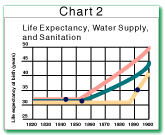
 Life Expectancy and Improvements in Water
Life Expectancy and Improvements in Water
Supply and Sanitation in Three French Cities, 1820-1900
1. Read the definition of life expectancy. From your own experience, list at least five factors that can
affect life expectancy.
2. Study Chart 2 which suggests a relationship between life expectancy and improvements in
water supply and
sanitation in three French cities from 1820–1900.
- What was the life expectancy in each city in 1820?
What was the life expectancy in each city in 1900? What
was the general trend for all three cities?
- About what year did each city begin its water supply and sanitation improvements?
- What does the chart suggest was the reason life expectancy was higher in Lyons in 1900 than in Paris or Marseilles?
- According to Chart 2, life expectancy in Marseilles began improving even before water and sanitation did. What are some
possible explanations for this?
3. In the social sciences, researchers usually use current data to explore conditions and issues. Why would water supply,
sanitation, and life expectancy information from 19th century France be helpful for people learning about these issues today?
4. Use the text, Chart 2, and your own knowledge, to argue for or
against this statement:
Access to safe water and sanitation are not luxuries that can wait for a stronger economy; rather, they are necessary
in order to build a stronger economy.
5. You are a government official in a middle-income country. A crisis exists in your country because an epidemic of cholera
has broken out and is spreading rapidly. You are holding an emergency meeting with other officials to decide what to do. As you
plan your course of action, consider the following:
- Cholera is spread by fecal contamination of food and water.
- Victims become extremely thirsty and need lots of water or they will die from dehydration.
- Hospitals are overcrowded in your country even when there is no epidemic.
- Households can boil their drinking water for 10 minutes to make it safe. But most people are not aware of this, and,
even if they were, it would cost the average poor family a third of its income to do so.
- Tourism has disappeared, and other countries will no longer buy fruits and vegetables grown in your country.
- What actions would you take immediately?
- What policies would you set up for the long run?
- How would you pay for these measures?
- What world resources might be available to help your country through this disaster?
Answers
Home | Site Guide | Modules | What's SD? | SD Post | Resources | About DEP | Feedback

 Life Expectancy and Improvements in Water
Life Expectancy and Improvements in Water